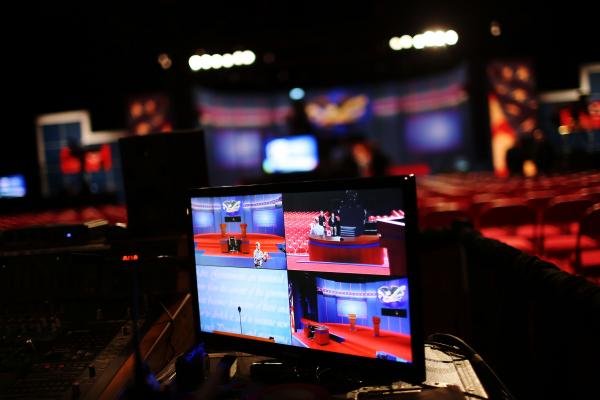Editor's Note: Tweet @newshour to ask the candidates to #TalkPoverty in Wednesday's debate.
Marianne Williamson, a bestselling author and convener of the upcoming Sister Giant conference on women and politics, has called on President Barack Obama and former Governor Mitt Romney to address “a meaningful array of topics” – including poverty, money in politics and incarceration rates in the U.S. – tonight during the first presidential debate.
Williamson talked to us earlier today about these issues, which are particularly pressing for Christians who take Matthew 25 seriously.
The interview was edited for length and content.
Q: What are you doing to get these issues out there?
A: Having a voice and creating your own platform is not all that difficult with today’s technology. I think what’s happening now is that, firstly, people are realizing that. Secondly, people are realizing that there are certain things that need to be said that simply are not being said as loudly as other things being said. When it comes to a politics of conscience, why wouldn’t we expect that during the debates there would be a conversation about the 23.1 percent of America’s children living in poverty, or the 34 percent of poor children, or the 46 million Americans living in poverty?
…
I don’t have the money of a huge corporate conglomerate to create television ads. But, you have what you have and I have what I have and a bazillion other people around the world what they have, and it’s a rising tide—it’s a wave. And something is potentially manifest here. I think that more and more Americans will hear the kind of shallow questioning that we can expect during much of the presidential debate. Americans realize that we’re not getting deeper answers because we’re not asking deeper questions. If we’re going to ask those deeper questions it’s because we ourselves do it.
Q: What’s up with all the money being pumped into political campaigns?
A: Those TV ads, given the current political situation, are necessary — or at least deemed necessary by candidates — in order to get elected and to stay in office. That’s where all those billions of dollars are going. And poor people can’t give those kinds of contributions. That’s why it could be legitimately argued that our elections have become auctions rather than elections. This imperils democracy. A poor person is as much a citizen of the United States as a rich person.
… Money should be able to buy a lot of things in America. It just shouldn’t be able to buy our government.
Q: What is the ideal response from the candidates?
A: No great social justice movement came from the two great political parties. Abolition came from the abolitionist party; women’s suffrage came from the women’s suffrage party; Social Security came from the socialist party. The two-party system as it is now — which, by the way, was not established in our Constitution or our Declaration of Independence, and which George Washington in his farewell address warned us against — is not going to call itself on its own lifelines. Corporate money not only is necessary given the current situation with Citizens United. Corporate money is necessary for both parties to stay in office. That’s why a politics of conscience should not be tied to either political party. It should not necessarily be tied to a political party at all.
You can have large amounts of money held in the hands of the very few, or you can have democracy. You cannot have both. Any system that is beholden to corporate money—to an economic bottom line rather than a humanitarian bottom line—is by definition not fully democratic. If we’re going to change the social contract from government “of the people, by the people, and for the people,” to a government “of a few of the people, by a few of the people, and for a few of the people,” then we need to be having a serious conversation about that.
+++++
Earlier this week in a piece Williamson wrote for The Huffington Post titled, “Give Democracy a Chance,” she raised some of these issues with samples of debate questions for the two presidential candidates, including:
- What is your feeling about the 23.1 percent child poverty rate in the United States — among 35 developed nations of the world, second only to Romania?
- How, if my child doesn’t get a decent education, can I expect that they’ll ever have a chance to attain true prosperity, much less a job at all, in a competitive global economy?
- Why are we just talking about tax rates — rather than on how little money the average citizen is able to make period, and how little access they have to capital?
- What do you think about the fact that the United States has the highest incarceration rate of any nation in the world?
Brandon Hook is Online Assistant for Sojourners.
Got something to say about what you're reading? We value your feedback!
